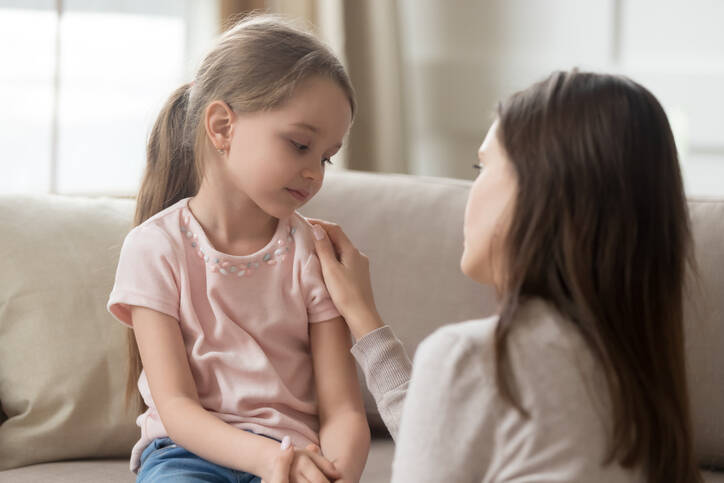- pediatriapreprax.sk - Approach to the management of nocturnal enuresis
- solen.cz - Bedwetting in children
- solen.sk - diagnosis and treatment of a child with bedwetting in a GP's office
Wetting in children? It is a burden for the child, but also for his family

When is bedwetting acceptable in children and when is it necessary to be vigilant or seek professional help? What attitude should a parent take?
Article content
In children, bedwetting is quite common. This problem causes a great impact on the social sphere and the psyche of the child.
Children with bedwetting problems can feel a lot of pressure and often have lowered self-esteem.
Why does bedwetting occur in children?
The occurrence of enuresis and its cause are still not completely clear. Genetic factors, the state of the vascular and nervous system and the depth of sleep are involved in its occurrence. Statistically, it is mainly boys who suffer from it.
In the recent past, bedwetting in children was considered a kind of taboo. This put a lot of pressure on the affected individual and his or her close family. It also made diagnosis and treatment more difficult.
Do you have preschoolers at home?
- Is your preschooler often sick?
- Lice and other parasites or diseases in our schools and kindergartens
When to address bedwetting in children?
Bedwetting after the age of 5 is already considered a situation that needs to be addressed. With daytime bedwetting, it is between the 3rd and 4th year of the child.
Active treatment is recommended for bedwetting that occurs in a child over the age of 7. At this age, correction is no longer likely to occur spontaneously.
Although the disappearance of bedwetting in children usually occurs without any intervention, if necessary, it is better to start treatment sooner rather than later. Therefore, any doubts should be discussed with your doctor in good time.
Types of bedwetting and influencing factors
When dealing with bedwetting, it is important to clarify the type of bedwetting, the factors affecting the child and his age. The cut-off age when bedwetting is considered enuresis is the 5th year of life.
Secondary enuresis
Secondary enuresis is the term for bedwetting that occurs after a dry period of at least six months when the child has had no problem retaining urine.
It usually occurs on a psychological basis. It may be due to parental divorce, death in the family, bullying, etc.
Primary enuresis
Primary enuresis means persistent bedwetting from birth. According to some sources, it afflicts up to 10% of children at the age of 7.
Bedwetting
Bedwetting (technically enuresis nocturna) is most often primary in nature. It is therefore mostly bedwetting that persists from birth and is usually not a manifestation of any organic or psychological disorder.
Overactive bladder
In children, this type of bedwetting is characterized by frequent urges to urinate even small amounts of urine, hurried and rapid urination, and its occurrence mainly during the day. At night, the child is usually able to hold the urine.
Often this type is accompanied by crossing of the legs, sitting or straddling. This type is related to the gradual development of lower urinary tract function.
After the age of 4 years, the child should be able to recognize the need to urinate in time and consciously delay or interrupt it.
A child with voiding difficulties should be examined and treated no later than the 5th year of life.
Definitions of some terms according to the International Society of Paediatric Continence
| enuresis | Intermittent urinary incontinence during sleep in a child over 5 years of age |
| severe nocturnal enuresis | more than 3 wet episodes per week |
| primary nocturnal enuresis | persists from birth without a prolonged dry pause |
| secondary nocturnal enuresis | bedwetting occurs after a dry interval of at least six months |
There is a questionnaire that helps the doctor to distinguish the type of bedwetting and thus determine the treatment. It includes questions about the frequency of night or day wetting, as well as the illness suffered and so on.
Management and treatment of enuresis
The general practitioner is the one who knows the child's psychomotor development as well as the social conditions in the family. He or she can therefore initiate diagnosis and treatment most effectively.
If the general practitioner finds a problem in the genital or urinary tract during the examination, cooperation with a paediatric urologist or neurologist is necessary.
For the doctor, information about the nature of the urine leakage is important. It is essential to know, for example, whether it is daytime or nighttime wetting. It also depends on whether it is only so-called dripping or whether the child experiences some discomfort during urination.
The doctor should be a kind of support and help in dealing with the urination problem. However, the main activity should be on the part of the parents, who often shift responsibility to the doctor.
The causes of bedwetting are varied, and so treatment may also be individual. It is therefore impossible to pinpoint a single treatment for all cases of urine leakage.
Involve the child in the solution
Motivate the child himself by giving him a notepad. There he will write down successes and dry nights himself.
It is important to create a calm atmosphere at home and reward each success with praise or even a small reward. Never punish the child for failure.
Enuretic alarm
As part of complementary treatment, there are also so-called enuretic alarms that are used for bedwetting. It is a device that contains a sensor to catch leaked urine and an alarm to alert the child to bedwetting.
This alarm usually includes a light that, together with a vibrating and sound effect, will turn on at the first drop of leaked urine. These stimuli will wake the baby up.
Subsequently, it is important that the child completes the need to use the toilet. The cooperation of the parent is required to supervise this.
Treatment with the aid of an arousal apparatus probably consists of promoting the maturation of the arousal response, which is impaired in children with bedwetting.
Medication as a solution?
Pharmacotherapy, i.e. the solution to bedwetting with the help of medication, is decided by the physician. For example, drugs such as tricyclic antidepressants, anticholinergics or desmopressin.
The decision to prescribe drug treatment is made solely by the doctor.
If the bedwetting persists for more than 12-18 months despite combined and honestly followed treatment, the child should be treated in a specialised centre.
Regime measures and other solutions
Treatment begins with thorough education of the parents and the child. Therapy focuses on preparing the child to perceive bladder filling. Various bladder exercises follow. These should be carried out in a playful manner.
Bladder exercises include:
- prolonging the intervals between urination
- attempting to suppress the urge to urinate
- attempting to delay urination
It is important not to punish the child for any failure, but rather to encourage him/her.
Sleep modification is an important part of the bedwetting treatment regime. The child should be used to a steady time. The room in which he sleeps should be at a lower temperature and well ventilated.
Do not make the child urinate in a semi-sleepy state. It is easy for the child to fixate on similar activity in sleep, which can lead to bedwetting.
It is important that the child takes most of his/her fluids in the morning. It is a good idea to gradually reduce fluid intake in the afternoon and evening. This does not mean leaving the child completely thirsty.
It is advisable if the last fluid intake is an hour before bedtime. If the child requires a drink during this time, give only 3-4 sips of plain water.
Limit the intake of sugary drinks and caffeinated drinks.
A brief overview of suitable and unsuitable drinks for the child
| suitable liquids | mineral water, lightly flavoured drinks, unsweetened tea, fruit juices |
| inappropriate liquids | sweetened water, black tea, coffee, alcohol, energy drinks |
Read more about which fluids are suitable for a child and in what amounts in the article Dehydration in children can be dangerous
In the evening, it is also important not to take fruits with a high water content, such as watermelon.
Evening bedtime guidelines:
- The child should go to bed at a regular hour
- air out the room before bedtime
- do not use nappies at night, replace them with a rubber bed pad instead
- the child must be properly urinated before going to bed
- Avoid evening stresses such as homework or watching TV
- the path to the toilet should be unobstructed with gentle lighting
Bladder and urinary tract control exercises
Exercises that improve bladder and urinary tract function and control include exercises aimed at prolonging the interval between urination and interrupting urination.
Prolonging urination
At the first urge to urinate, the child holds back the muscles before urinating.
Intermittent urination
During urination, ask the child to interrupt urination for a short time. Then he can resume and interrupt again. He can repeat this 2-3 times per urination.
Interesting resources










